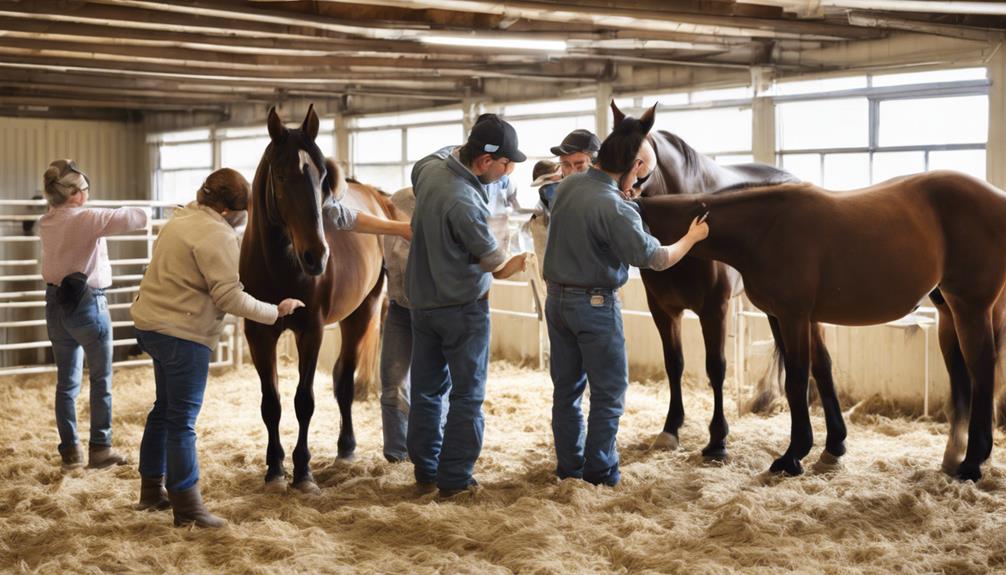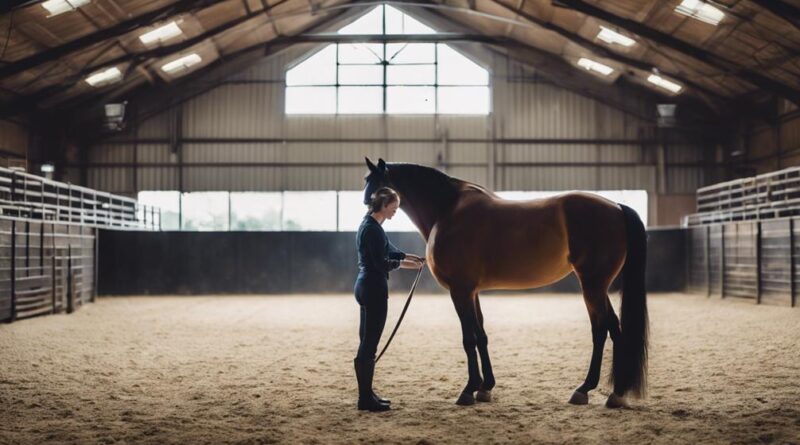Acquiring Proper Training for Successful Horse Breeding
When pursuing a path in horse breeding, navigating the necessary training can be a turning point in your success.
From understanding the intricate ins and outs of equine reproduction to mastering the art of genetic selection, embarking on this journey requires more than just a love for horses.
But what does it truly take to excel in this field and ensure the future of your equine endeavors?
Let's explore the critical components that could elevate your breeding practices and set you apart in the competitive world of equine genetics.
Qualifications for Horse Breeding
To be successful in horse breeding, it's essential to possess a deep understanding of equine genetics and breeding techniques. When it comes to breeding techniques, it's crucial to be well-versed in methods such as artificial insemination, embryo transfer, and live cover breeding. Each technique has its own set of advantages and considerations, so being knowledgeable about them will help you make informed decisions for your breeding program.
In addition to understanding breeding techniques, being familiar with breeding regulations is equally important. Breeding regulations govern various aspects of horse breeding, including registration requirements, breeding standards, and health testing protocols. Staying compliant with these regulations not only ensures the health and well-being of the horses but also maintains the integrity of the breeding industry.
As a breeder, it's your responsibility to stay updated on the latest developments in equine genetics and breeding practices. By continuously educating yourself and seeking opportunities to expand your knowledge, you can enhance the success of your breeding program and contribute positively to the equine industry. Remember, success in horse breeding isn't just about luck; it's about dedication, knowledge, and a deep passion for the animals you work with.
Educational Background for Breeders
Having a solid educational background is crucial for breeders looking to excel in the field of horse breeding. Understanding breeding techniques and staying updated on the latest research is essential for success. Courses or degrees in animal science, equine reproduction, or genetics can provide valuable knowledge in these areas.
For breeders, grasping the intricacies of reproductive health and nutrition is vital. Courses that cover topics such as mare and stallion reproductive anatomy, breeding cycles, and foal care can offer valuable insights. Learning about the impact of nutrition on breeding success and the health of the mare and foal is also essential.
Research plays a significant role in advancing breeding practices. Being able to critically analyze studies and apply findings to improve breeding programs is a valuable skill. Courses in research methods, data analysis, and scientific writing can enhance a breeder's ability to contribute to the field.
Hands-On Training Requirements
Engaging in practical experience through hands-on training is essential for mastering the skills required in successful horse breeding. To excel in this field, you must actively participate in various activities that will provide you with invaluable practical skills and hands-on experience.
Here are some key aspects to focus on during your hands-on training:
- Practical Skills: Hands-on training allows you to develop practical skills such as proper handling of horses, grooming techniques, and understanding basic equine care practices.
- Hands-On Experience: Direct interaction with horses will help you gain valuable hands-on experience in observing their behavior, identifying signs of illness or distress, and learning how to respond appropriately.
- Breeding Techniques: Hands-on training will expose you to essential breeding techniques like artificial insemination, pregnancy detection, foaling assistance, and neonatal care.
- Animal Behavior: Understanding equine behavior is crucial for successful horse breeding. Hands-on experience will teach you how to interpret body language, establish trust with horses, and manage their behavior effectively.
Specialized Courses in Equine Reproduction
Enroll in specialized courses in equine reproduction to deepen your knowledge and expertise in this critical aspect of horse breeding. These advanced courses cover a range of reproductive techniques essential for successful equine breeding. By investing in specialized education, you equip yourself with the skills needed to navigate the complexities of equine reproduction confidently.
These courses delve into the intricacies of reproductive physiology, artificial insemination, embryo transfer, and advanced reproductive technologies. You'll learn about the latest developments in assisted reproductive techniques, allowing you to stay at the forefront of innovative breeding practices. Moreover, specialized courses provide hands-on experience and practical training, ensuring you're well-prepared to handle real-world breeding scenarios effectively.
Equine breeding requires a deep understanding of reproductive processes and the ability to troubleshoot any issues that may arise. By enrolling in specialized courses, you gain valuable insights into managing breeding operations, optimizing fertility rates, and maximizing reproductive success. Whether you're a novice breeder looking to establish a solid foundation or an experienced professional seeking to expand your expertise, these courses offer a wealth of knowledge to enhance your breeding practices. Invest in your future as a successful horse breeder by enrolling in specialized courses in equine reproduction today.
Importance of Genetics Knowledge
Understanding genetics is crucial for successful horse breeding as it forms the foundation for informed breeding decisions and improving desirable traits in offspring. Genetic selection and breeding techniques play a vital role in shaping the future generations of horses. Here are some key points to consider:
- Genetic Selection: Utilizing knowledge of genetics allows you to carefully select breeding pairs based on their genetic makeup, increasing the likelihood of passing on desired traits to the offspring.
- Breeding Techniques: Understanding genetics helps in implementing advanced breeding techniques such as artificial insemination and embryo transfer, which can enhance breeding efficiency and success rates.
- Hereditary Traits: Genetics knowledge enables you to predict the hereditary traits that offspring are likely to inherit from their parents, aiding in the selection process for desired characteristics.
- DNA Analysis: Conducting DNA analysis can provide valuable insights into the genetic composition of horses, helping breeders make more informed decisions regarding breeding matches.
Certification in Equine Management
Obtaining certification in Equine Management can significantly enhance your knowledge and skills in caring for and managing horses. This certification covers crucial aspects such as equine nutrition and breeding regulations. By completing a certification program, you'll deepen your understanding of the dietary needs of horses, including the importance of proper nutrition for their overall health and performance. You'll learn how to create balanced feeding plans tailored to individual horses, ensuring they receive the necessary nutrients for optimal well-being.
Moreover, certification in Equine Management will also familiarize you with breeding regulations that govern the industry. Understanding these regulations is essential for anyone involved in horse breeding operations to ensure compliance with legal requirements and ethical standards. You'll learn about breeding practices, genetic considerations, and proper documentation needed for registering and tracking horses.
Practical Experience in Breeding Operations

Gaining hands-on experience in breeding operations is essential for aspiring horse breeders to develop practical skills and deepen their understanding of the breeding process. This practical experience provides a foundation for success in the industry and allows individuals to refine their techniques through hands-on learning.
Here are some key aspects to focus on when gaining practical experience in breeding operations:
- Breeding Techniques: Getting hands-on experience with breeding techniques such as artificial insemination, live cover breeding, and embryo transfer is crucial for understanding the different methods used in horse breeding.
- Reproductive Management: Learning about reproductive management involves gaining practical skills in areas like monitoring heat cycles, conducting pregnancy checks, and managing the health of pregnant mares.
- Practical Skills: Developing practical skills like handling stallions, assisting with foaling, and caring for newborn foals are essential for a successful career in horse breeding.
- Industry Exposure: Engaging with industry professionals, visiting breeding farms, and attending breeding seminars provide valuable exposure to different aspects of the breeding operations and help in staying updated with industry trends.
Continuous Learning in Industry Trends
Staying updated on industry trends is crucial for success in horse breeding. Keeping abreast of industry updates and engaging in ongoing education are essential components of professional development in the field. As a horse breeder, staying informed about breeding advancements can give you a competitive edge and help you make informed decisions that positively impact your breeding operations.
Attending workshops, seminars, and conferences focused on industry trends allows you to network with other professionals, exchange ideas, and gain valuable insights into the latest breeding techniques. These events also provide opportunities to learn from experts in the field and stay current on emerging technologies that can enhance your breeding practices.
Additionally, subscribing to industry publications, joining online forums, and following reputable websites can help you stay informed on a day-to-day basis. Being proactive in seeking out new information and continuously expanding your knowledge base won't only benefit your horses but also contribute to the overall success of your breeding program.
Frequently Asked Questions
What Are Some Common Challenges That Breeders Face When Trying to Successfully Breed Horses?
When breeding horses, you might encounter various challenges. Overcoming these obstacles is crucial for success.
By implementing effective breeding strategies, such as selecting suitable mates, managing reproductive health, and ensuring proper nutrition, you can increase your chances of achieving your breeding goals.
How Can Breeders Ensure the Health and Well-Being of Both the Mare and Foal During the Breeding Process?
To ensure the health and well-being of both the mare and foal during the breeding process, focus on mare nutrition and foal care. Providing quality nutrition to the mare before and after breeding is crucial for a successful pregnancy. Monitor the mare closely for any signs of distress and have a veterinarian check her regularly.
Additionally, prepare a comfortable and safe environment for the foal's arrival, including proper nutrition and veterinary care.
Are There Any Specific Technologies or Advancements in Equine Reproduction That Breeders Should Be Aware Of?
You should stay informed about the latest breeding advancements and emerging technologies in equine reproduction. Keeping up with these developments can give you a competitive edge and help you make informed decisions when breeding horses.
Understanding how to leverage these tools effectively will contribute to your success as a breeder. Stay engaged with the industry to ensure you're utilizing the most cutting-edge methods available for successful horse breeding.
What Are Some Key Factors to Consider When Selecting a Stallion for Breeding Purposes?
When selecting a stallion for breeding, consider factors like conformation, temperament, pedigree, and performance history. Look for genetic diversity to improve the overall quality of offspring.
Evaluate the stallion's strengths and weaknesses against your mare's traits to complement and enhance desirable features. Seek expert advice and conduct thorough research to ensure a successful breeding match that aligns with your goals and breeding program.
How Can Breeders Stay Informed About New Developments and Trends in the Horse Breeding Industry?
To stay informed about new developments and trends in the horse breeding industry, you should actively engage with industry publications, attend conferences, and connect with other breeders.
Following reputable websites, joining online forums, and participating in workshops can also help you stay ahead of the curve.
Conclusion
Congratulations on taking the necessary steps to acquire proper training for successful horse breeding. By obtaining the qualifications, education, hands-on training, specialized courses, genetics knowledge, certification, and practical experience, you're setting yourself up for success in the industry.
Remember to stay current with industry trends and continue your learning journey to stay ahead in the field of equine reproduction.
Best of luck in your future breeding endeavors!
